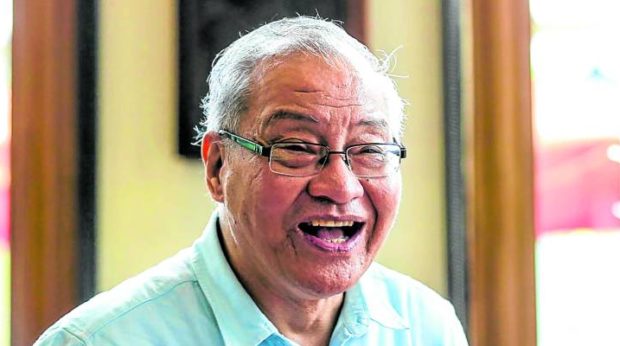Sta. Romana, 74: journo, diplomat, PH man in China
MANILA, Philippines — The country lost one of its distinguished representatives to the international community, the diplomat, journalist, educator and activist Jose Santiago “Chito” Sta. Romana, who died on Monday at the age of 74.
The Department of Foreign Affairs (DFA), in its statement on Sta. Romana’s passing, did not mention the cause of his death, while the Chinese Ministry of Foreign Affairs said he died “due to an illness.”
Both the DFA and Malacañang emphasized his “distinguished tenure” as the country’s ambassador to China—“the most challenging foreign post,” the department even said, through which “Philippine-China relations… flowered all the more in maturity and were deeply strengthened” on his watch.
Communications Secretary Martin Andanar, the acting presidential spokesperson, said in a Palace briefing: “We pay tribute to Ambassador Sta. Romana for his contributions in strengthening Philippine-China relations.”
Chinese Ambassador to Manila Huang Xilian showed his familiarity with the background of the Philippines’ representative to his country, saying that “over the past 51 years, starting from a foreign student learning Chinese in Beijing, to ABC’s China correspondent for over 20 years and to Philippine ambassador to China, Ambassador Chito has spent the best part of his life understanding and helping the world and the Philippines to understand China.”
Article continues after this advertisementHuang also cited Sta. Romana’s first visit to China “when he headed the Philippine Youth Delegation in 1971.”
Article continues after this advertisement“I greatly value our time working together and will always be grateful for his friendship and undeniable contribution to the development of China-Philippines relations,” Huang said.
New life in Beijing
Sta. Romana was an alumnus of De La Salle University, where he finished degrees in economics and in commerce. He also completed a master’s degree at the Fletcher School of Law and Diplomacy in Massachusetts.
He was 23 when he and other student leaders went to China upon the invitation of the Beijing-based Chinese People’s Friendship Association, an organization aimed at fostering international cooperation.
“It was supposed to be [just] a three-week visit to China” Sta. Romana said in a 2011 interview with the Inquirer, recounting how his life there began.
But while he was in China, President Ferdinand Marcos suspended the writ of habeas corpus following the Plaza Miranda bombing of Aug. 21, 1971, and this led to the arrest of several activists.
Sta. Romana recalled that he and four other activists in his delegation also feared arrest and decided to remain in China, ending up staying indefinitely as Marcos declared martial law a year later.
Among his fellow delegates were Ericson Baculinao, then president of the student council of the University of the Philippines (UP), the late Dr. Mario Miclat, who later became dean of the UP Asian Center, and Jaime FlorCruz of the Philippine College of Commerce—now the Polytechnic University of the Philippines—who headed the League of Editors for a Democratic Society. (FlorCruz would eventually become a journalist like Sta. Romana and would head CNN’s Beijing bureau.)
In his new life in Beijing, Sta. Romana studied Mandarin and became an editor and translator for a publishing house there, before seizing an opportunity to become a correspondent for the Washington Post.
Journalist, diplomat
After Marcos’ fall in 1986, Sta. Romana returned home, but would again find his calling overseas.
As a reporter and later producer for ABC News, he covered major stories in Beijing, from the Tiananmen Square protests in 1989 to the Olympics in 2008. Soon after that he became ABC’s Beijing bureau chief.
His team won an Emmy award in the news and documentary category in 2000, and earned two other Emmy nominations in 2001 and 2006. He was also awarded by the Overseas Press Club of America for his coverage of the earthquake in China’s Sichuan province in May 2008.
Upon retiring in 2010 after 21 years with ABC News, Sta. Romana and his wife, Nancy, returned to the Philippines. He worked as a lecturer on Chinese politics at UP’s Asian Center and headed the Philippine Association of Chinese Studies.
In 2016 he began a new career in diplomacy with his appointment as ambassador to China, amid tensions between the Asian power and the Philippines over the West Philippine Sea.
Beijing’s media welcomed that appointment, with the China Daily quoting two senior researchers as saying that the new envoy, “a China hand” and “a bridge” between the two countries, “will help Manila better understand China’s policies” and “reduce misunderstanding.”
Maritime dispute
Sta. Romana said the country’s maritime dispute with China was a matter that should be dealt with “diplomacy” and “deterrence.”
He said the country’s approach was to discuss the dispute but manage it so that it would not turn into a crisis and an obstacle to cooperation.
In line with President Rodrigo Duterte’s goal to encourage friendlier ties with China, Sta. Romana said the government employed a “dual-track strategy” and dealt with the West Philippine Sea as a “separate track.”
“In doing that, you open another track for areas where there are no disputes, and that is the strategy we are following—promoting economics, trade, commerce, educational exchange, cultural exchange, promoting sports,” he told reporters in 2017.
Maritime law expert Jay Batongbacal, director of the UP Institute of Maritime Affairs and Law of the Sea, said: “He (Sta. Romana) came at a time when we most needed an envoy who truly understood China. His loss brings great sadness that our people can no longer be privileged by his service.”
Austin Ong, a former student of Sta. Romana, said his mentor also became popular among Filipino workers in China, who called him the “people’s ambassador.”
—WITH REPORTS FROM NESTOR CORRALES AND INQUIRER RESEARCH
RELATED STORIES
DOH remembers PH envoy to China Sta. Romana, notes role in vaccine procurement
Palace mourns passing of PH envoy to China Chito Sta. Romana
